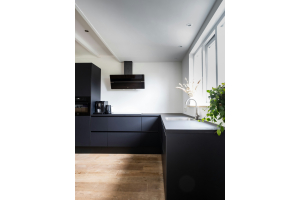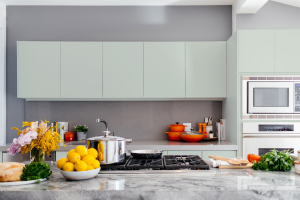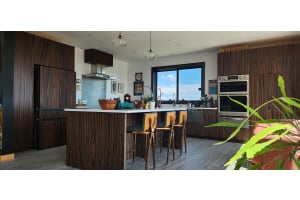Chipping paint on cabinet doors is like a pebble in your shoe–small but powerful in its ability to distract. Whether you're a savvy homeowner, a house flipper on a mission, or a professional builder adding value to a property, chipping paint is an adversary you want to know how to defeat.
Whether you’re painting cabinet doors with a spray gun or a brush, the goal should be a finish that stays intact. This article will explore how to prevent chipping on cabinet doors with some simple, effective steps.
The Why Behind Chipping
First things first, let's understand the enemy. Chipping occurs for a few reasons: the surface was poorly prepared for paint, low-quality paint was used, the cabinets are used roughly, or the passage of time is the culprit. Whatever the reason, the solution to chipping paint lies in careful preparation and the right materials.
For the Home Renovator
If you’re a homeowner who wants to revamp your home, cabinets are an easy and potent place to start. Whether you have painted shaker cabinet doors or simple laminate, replacing a chipping paint job is one of the simplest ways to give your house a facelift and make it even more your own.
For the House Flipper
When it comes to increasing a property’s value, details matter. Chipping cabinets can be distracting to potential buyers, leading them to wonder whatever small details are decaying somewhere in the house.
For the Professional Builder
When you’re being paid to renovate or build a home from scratch, quality and longevity are paramount. Delivering chip-resistant cabinet doors means happy clients and a reputation for excellence.
The Path to Chip-Resistant Cabinet Doors
Here’s a step-by-step guide to making your cabinets look flawless and keeping them that way:
Start with a Clean Slate
Remove the doors and hardware. Cleaning is crucial–dirt, grease, and old paint can prevent new paint from adhering properly. It’s at this point you should consider if you should paint the cabinet hinges.
Sand to Perfection
Smooth out every surface, but be gentle. Gouges and scratches can show through paint, leaving you with a product that’s unseemly as chipping paint.
Wipe Away the Dust
After sanding, wipe down the doors with a damp cloth to remove dust.
Prime Time
A good primer helps the paint stick and enhances durability.
Choose Quality Paint
Not all paints are created equal. Someone forgetting this fact might be what got you into this problem in the first place. Invest in high-quality paint that’s formulated for cabinets. It might cost more, but it’s worth it in the long run.
Apply with Care
Whether you’re using a brush, roller, or sprayer, apply the paint in thin, even coats. Patience is key. Let each coat dry thoroughly before applying the next.
Gentle Reinstallation
Reattach the doors and hardware gently.
Tips and Alternatives
Avoid Humidity
Paint in a humidity-controlled environment. Too much moisture in the air can affect how paint dries and adheres.
Mind the Edges
Edges are prone to chipping, so pay extra attention to them during preparation and painting.
Update Hardware
Sometimes, the way hardware sits on a cabinet can lead to chipping. Consider updating to hardware that minimizes friction.
Vinyl Wraps
As an alternative to painting, vinyl wraps offer a durable and diverse range of finishes that won’t chip.
Preparing for the Future
Achieving chip-resistant cabinet doors requires a blend of preparation, patience, and the right materials. Whether you’re a homeowner on a DIY journey, a house flipper eyeing profit, or a professional builder aiming for efficient quality, these steps will guide you toward a kitchen that not only looks fantastic and stands the test of time.
When you’re ready to replace your cabinets with flawless new upgrades, check out what 27estore has to offer that can transform your home while saving you time and money!





